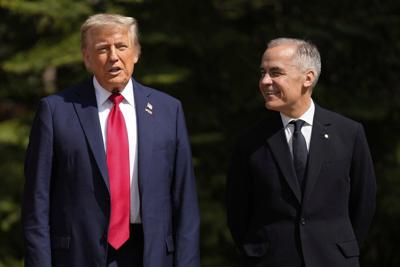After several months of , Canadians have come around to the idea that there are practical limits in politics, what with Prime Minister Mark Carney having recently removed certain retaliatory tariffs against the United States. In retrospect, it’s evident that for many Canadian voters, the emotional satisfaction of responding with “elbows up” rhetoric to what they perceived as U.S. President Donald Trump’s high-handedness took precedent over any analysis of their real interests in the matter.
You could see reality set in as that all this really was for the best. Of course, from the start, the odds that Carney would capitulate in this way might have been conservatively estimated at around 100 per cent.
It’s unclear what the average Liberal voter thought would be the outcome here. Some of this is doubtless the fault of our media, which have often published stories about the economic harm of Canadian boycotts to Americans. It’s not that we can’t cause pain to liquor wholesalers or realtors in Florida; it’s that there’s never been convincing evidence any such pain would translate into U.S. federal policy changes. Besides, Trump is immune to electoral pressure at this point, and that Canadians are prepared to boycott the U.S. in meaningful numbers.
In principle, there’s nothing wrong with imposing retaliatory tariffs, but as with most economic policies, this one lives or dies by consequentialist logic. That is, if retaliatory tariffs get Trump to back down, then they’ve worked; if they don’t, then Ottawa has simply imposed further costs on Canadian consumers to no particular national advantage. Sure, you could argue that tariffs also hurt American consumers, but unless they hurt Americans worse, then they’re reminiscent of that old business joke: we’re losing money on every unit, but we’ll make it up in volume. If you can’t cause sufficient economic pain to incentivize changes to U.S. trade policy, then there’s no win to be had.
The complaint now is that Canada will have made concessions on border security, defence spending and service taxes in return for very little. But the Trump administration’s position seems to be that Canada and other countries that have hitched a free ride on the U.S. global-alliance structure already get quite a lot. In this respect, Trump is shifting the U.S. toward a more nakedly transactional and extractive posture vis-à -vis its allies.
Canadians understandably might not care for this new approach, but either militarily or economically to push back — for the strongest source of leverage in this or future negotiations with the U.S. (or any other country) is the sturdiness and dynamism of Canada’s economy.
More specifically, Canada’s real leverage lies not with our consumer market (our population is approximately that of California, but we have a vastly lower per capita GDP); it lies with our natural resources and raw materials, although as yet we’re not in a position to exploit them sufficiently. Indeed, the only hope that Carney’s retaliatory tariffs might have had would’ve been their operating in concert with other U.S. trade partners. But to overcome that problem of collective action, . Meanwhile, we can’t even sell LNG to Europe without using the U.S. as an intermediary.
It’s natural that the imposition of tariffs by a neighbouring power would raise the ire of ordinary Canadians more than would the failures of their own government to prepare for such a moment — . But the tariff question is secondary to the of the recent lost decade that left Canada so unprepared in the first place.
But ultimately, I’d just like to be able to buy real bourbon whiskey again. As a certain U.S. president might say: thank you for your attention to this matter.
Error! Sorry, there was an error processing your request.
There was a problem with the recaptcha. Please try again.
You may unsubscribe at any time. By signing up, you agree to our and . This site is protected by reCAPTCHA and the Google and apply.
Want more of the latest from us? Sign up for more at our newsletter page.


























To join the conversation set a first and last name in your user profile.
Sign in or register for free to join the Conversation